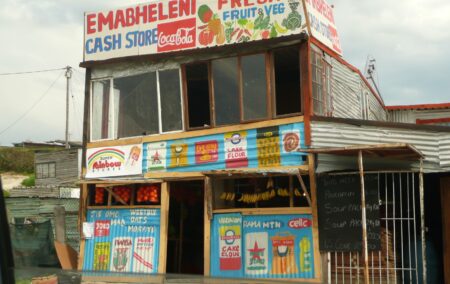History is not just something we study in books; it often comes back to haunt us. Today, South Africa is repeating policies that once crushed black entrepreneurship during apartheid.
The recent loss of young lives, and the anger it has sparked, have understandably heightened calls for action.
Yet, the government’s crackdown on spaza shops, particularly those owned by foreign nationals, risks intensifying problems rather than solving them. The raft of new regulations being brought to bear is reminiscent of apartheid-era tactics that stifled economic growth and opportunity for millions.
Economic control then and now
During apartheid, black business owners in townships faced relentless restrictions that made legal trade nearly impossible. Business licences were withheld, forcing entrepreneurs into the informal sector, where they were vulnerable to police raids, closures, and confiscation of their goods. These laws were about keeping black South Africans economically dependent.
Today, a similar pattern emerges. The crackdown on foreign-owned spaza shops includes a requirement to invest at least R5 million to operate legally, a demand beyond reach for most small traders. While presented as necessary for public safety, these regulations are less about ensuring compliance and more about restricting competition and controlling who gets to participate in the economy. The outcome will be the same as before: these restrictions will drive out both local and foreign traders, cutting off affordable options for communities.
The cycle of overregulation
Overregulation suffocates economic life. During apartheid, black-owned businesses were effectively barred from operating through punitive laws. Now, today’s demands for registration, zoning compliance, and other bureaucratic hurdles apply across the board and leave businesses with a choice: operate illegally or shut down entirely. This crackdown will harm one of the few vibrant sectors left in South Africa’s economy, further stifling small businesses, whether owned by South Africans or foreign nationals.
A threat to the township economy
The consequences of these regulations will be devastating township businesses that provide essential, affordable goods risk being driven out of the market. Spaza shops are more than just retailers; they are the backbone of township economies, filling gaps where formal retailers will not go. This crackdown will harm both foreign and South African shop owners, reducing access to basic goods and impacting the communities that rely on them for everyday necessities.
We have seen this before
During apartheid, the Free Market Foundation (FMF) fought for black entrepreneurs’ right to trade freely, challenging restrictions that deprived black people of their ability to participate fully in the economy. Decades later, we face a similar struggle for economic freedom, as the state imposes yet another set of harmful regulations that will hurt local and foreign traders alike at a time when South Africa needs small businesses to thrive and create jobs.
From tragedy to farce
As Karl Marx once said, “History repeats itself, first as tragedy, second as farce.” One of the many tragedies of apartheid was that overregulation and government control crushed black entrepreneurship and stifled the economic potential of millions. Today, the farce lies in repeating those same failed policies, now under the guise of controlling foreign-owned businesses. In its haste to address certain concerns, the government is throwing the baby out with the bathwater, imposing restrictions that choke economic opportunity for South African and foreign traders alike.
South Africa cannot afford to let this farce play out. Instead of imposing barriers, the government should be removing them, allowing thousands of new businesses − South African and foreign-owned − to be established every year.
Blaming spaza shops will not create jobs or bring safety. If we are to break free from this cycle of destructive government interference, we must embrace economic freedom as the only path to prosperity. Otherwise, history will continue to repeat itself, and South Africa’s economy will remain shackled by policies that should have been left in the past.
Apartheid was a tragedy; repeating all too many of the things that made it so is a farce.
[Image: FreddieA, https://commons.wikimedia.org/w/index.php?curid=24943694]


